Spay/Neuter Awareness Month: The Benefits of Spaying and Neutering Your Pets
Written by Humane Pennsylvania Chief Veterinary Officer, Dr. Alicia Simoneau
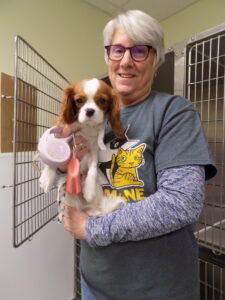 Thursday, February 23, 2024, is World Spay Day, and Humane Pennsylvania is observing the holiday by speaking on the benefits of spaying and neutering your pets. Companion animals not only help us stay happy and healthy, but they are like members of our families. They must receive necessary medical care so that we can enjoy as much time with them as possible. Maintaining your pet’s well-being can be achieved through preventative measures such as regular veterinary exams, vaccinations, antiparasitic medications, and spay/neuter procedures.
Thursday, February 23, 2024, is World Spay Day, and Humane Pennsylvania is observing the holiday by speaking on the benefits of spaying and neutering your pets. Companion animals not only help us stay happy and healthy, but they are like members of our families. They must receive necessary medical care so that we can enjoy as much time with them as possible. Maintaining your pet’s well-being can be achieved through preventative measures such as regular veterinary exams, vaccinations, antiparasitic medications, and spay/neuter procedures.
Humane Pennsylvania’s Healthy Pets Initiative aims to provide access to affordable veterinary care for all pet owners and their furry companions. Our primary focus has been preventative care to avoid future illnesses, especially those with substantial price tags. We proudly announce that Humane Pennsylvania now offers affordable spay and neuter procedures at our Freedom Center for Animal Life-Saving and Lancaster Center for Animal Life-Saving. Spaying and neutering your pet is another way to prevent future medical problems while decreasing the number of homeless pets entering our shelters.
What Does it Mean to Spay or Neuter Your Pet?
Spaying and neutering are surgical procedures that will prevent your pet from reproducing. These procedures are usually performed at six months of age and under anesthesia with appropriate pain medication. Spaying is an abdominal surgery in which the female reproductive organs, including the uterus and ovaries, are removed. Neutering means removing both testicles through a small incision at or above the scrotum.
What are the Medical Benefits of Sterilization?
Spaying or neutering your pet doesn’t just prevent unwanted puppies or kittens, but it also has many medical benefits. Dogs and cats spayed earlier in life are less likely to develop mammary cancer. In addition, this procedure will prevent ovarian cancer and life-threatening infections within the reproductive tract. These illnesses are painful, and treatments can be very costly. Spaying your pet will also avoid high-risk pregnancies or birth complications that require emergency care. Neutering your pets can prevent prostate issues and testicular cancer.
Sterilization can reduce or eliminate unwanted behaviors such as urine marking and aggression. Unneutered male dogs and cats are more likely to roam, putting them at risk of getting lost or hit by a car.
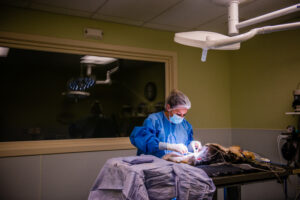
How does Spay/Neuter Help our Community?
Controlling the population of unwanted dogs and cats in our communities can save lives! Shelters like ours do our best to offer every animal a warm bed, a full belly, and the necessary medical care to ensure the best quality of life. Unfortunately, the more homeless animals in our community, the harder it is for us to help each one find the homes they deserve. Spaying and neutering companion animals keep them safe, healthy, and at home with you – the caretakers who love them.
Humane Pennsylvania’s Affordable Spay/Neuter Clinic is now taking appointments every Tuesday in Reading and every Thursday in Lancaster, and offers sterilization packages that include vaccines, microchips, and antiparasitic medications. Providing this high-quality, low-cost option for surgery will decrease the number of homeless pets in our community and our shelters. In addition, spaying and neutering your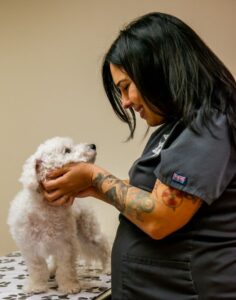 pets will prevent future costly issues such as uterine infections, cancers, and behavioral problems. For more information or to make an appointment, please visit our website: Affordable Spay/Neuter – Humane Pennsylvania (humanepa.org)
pets will prevent future costly issues such as uterine infections, cancers, and behavioral problems. For more information or to make an appointment, please visit our website: Affordable Spay/Neuter – Humane Pennsylvania (humanepa.org)


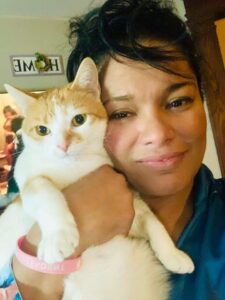

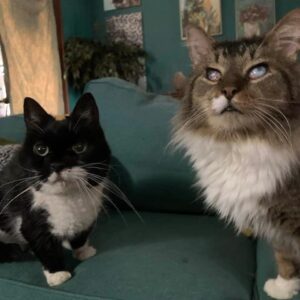 infection among other things. After her vet check, it was recommended to adopt her out as hospice care. I decided to adopt her knowing I might not have her for long. Sadly, she passed away four months later, but I made sure she spent the last few months of her life happy and loved.
infection among other things. After her vet check, it was recommended to adopt her out as hospice care. I decided to adopt her knowing I might not have her for long. Sadly, she passed away four months later, but I made sure she spent the last few months of her life happy and loved. One September morning a cat was abandoned at the shelter. We scanned the cat and found out she was adopted from our organization 15 years ago. She was frail and extremely underweight. Her name was Rapunzel but I called her Princess Thumbs because she was a polydactyl cat. After getting her blood work done it turned out that she had hyperthyroidism and needed to be on medication and a special diet. After doing some research about the disease, I adopted her. I was not sure of the outcome since she was so thin and I had no idea how long she was in this condition but I was determined to try. Unfortunately, her illness was too far gone, but she did give me two wonderful weeks. She was truly an amazing cat. I miss you, my crunchy princess.
One September morning a cat was abandoned at the shelter. We scanned the cat and found out she was adopted from our organization 15 years ago. She was frail and extremely underweight. Her name was Rapunzel but I called her Princess Thumbs because she was a polydactyl cat. After getting her blood work done it turned out that she had hyperthyroidism and needed to be on medication and a special diet. After doing some research about the disease, I adopted her. I was not sure of the outcome since she was so thin and I had no idea how long she was in this condition but I was determined to try. Unfortunately, her illness was too far gone, but she did give me two wonderful weeks. She was truly an amazing cat. I miss you, my crunchy princess. surrendered for meowing too much. Her name was Marigold. She was super sweet and did indeed “talk” a lot, which made me love her even more. After getting blood work done for her, results showed that she had hyperthyroidism. I was a little nervous because I was worried I would lose her too. I still decided to adopt her and give her a chance. Well, she is now a happy cat that “talks too much” if her bowl is empty. She will hop after you like a rabbit making sure you hear her loud and clear.
surrendered for meowing too much. Her name was Marigold. She was super sweet and did indeed “talk” a lot, which made me love her even more. After getting blood work done for her, results showed that she had hyperthyroidism. I was a little nervous because I was worried I would lose her too. I still decided to adopt her and give her a chance. Well, she is now a happy cat that “talks too much” if her bowl is empty. She will hop after you like a rabbit making sure you hear her loud and clear. During our annual 12 Days of Adoptions event during the holidays, the majority of the cats at the shelter were finding homes. There was one cat I was hoping would find her furever home since she had been overlooked for 8 months. Her name was Karma, an adorable Orange and white cat with the cutest “RBF” squishy face. Karma had a few medical issues. She was FIV+, had an old ankle injury that made her limp, and experienced bladder issues which would require a special diet and medication for life. When Christmas Eve and the last day of the adoption special arrived, I told Karma “It’s time to go home”. It’s been two months since she came home and I’m so happy I made that decision. Her health has since improved and she couldn’t be happier in her new home.
During our annual 12 Days of Adoptions event during the holidays, the majority of the cats at the shelter were finding homes. There was one cat I was hoping would find her furever home since she had been overlooked for 8 months. Her name was Karma, an adorable Orange and white cat with the cutest “RBF” squishy face. Karma had a few medical issues. She was FIV+, had an old ankle injury that made her limp, and experienced bladder issues which would require a special diet and medication for life. When Christmas Eve and the last day of the adoption special arrived, I told Karma “It’s time to go home”. It’s been two months since she came home and I’m so happy I made that decision. Her health has since improved and she couldn’t be happier in her new home.